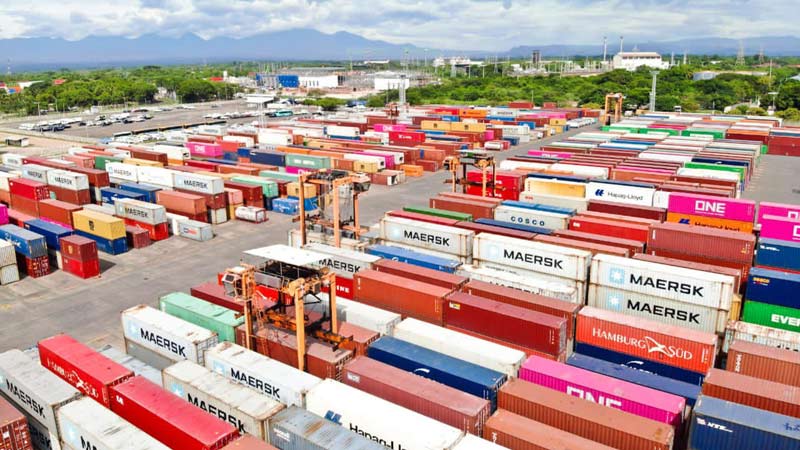
El Salvador’s main exported goods
El Salvador, a small Central American country, has a diverse economy with exports forming a key component of its gross domestic product (GDP). Although historically reliant on agriculture, El Salvador has, in recent decades, diversified into manufacturing and textiles. This shift has been essential for economic growth, job creation, and increased foreign exchange. Here’s an overview of El Salvador’s main exported goods and the sectors driving its economy.
1. Textiles and Apparel
Textiles and apparel represent the backbone of El Salvador’s export economy, contributing a substantial portion of its total exports. The country has a robust textile manufacturing sector, which benefits from its inclusion in trade agreements, particularly the Dominican Republic-Central America Free Trade Agreement (CAFTA-DR) with the United States. This agreement facilitates duty-free access to the U.S. market for El Salvador’s garments, boosting its competitiveness. Products such as T-shirts, socks, undergarments, and athletic wear are among the leading exports within this sector. The textile industry also supports employment, creating thousands of jobs in El Salvador’s maquila (assembly) sector.
2. Coffee
Coffee remains a traditional yet significant export for El Salvador. Known for its quality Arabica beans, Salvadoran coffee has a strong reputation in the global market, especially in countries that value premium and specialty coffee. The majority of the coffee produced in El Salvador is grown in high-altitude regions, which gives it unique flavor characteristics appreciated by coffee enthusiasts worldwide. Although the industry has faced challenges due to price fluctuations, diseases affecting coffee plants, and climate change, it remains an important source of income for many Salvadorans, particularly in rural areas. Major importers of Salvadoran coffee include the United States, Germany, and Japan.
3. Sugar
Sugar is another leading agricultural export, with El Salvador ranking among Central America’s top producers. The country’s sugarcane plantations are concentrated in the coastal plains, where climate and soil conditions are ideal for sugar production. El Salvador exports raw and refined sugar, primarily to markets in the United States and other Latin American countries. Like coffee, sugar production supports thousands of jobs in rural communities, contributing to the country’s economic stability. Despite competition and fluctuations in global sugar prices, sugar remains a stable component of El Salvador’s export portfolio.
4. Electrical Equipment and Electronics
In recent years, El Salvador has diversified into exporting electronic and electrical components, particularly items like circuit boards and cables. These exports are often the result of foreign investment, which has enabled El Salvador to establish assembly plants and maquiladoras that specialize in producing electronic goods. The United States, once again benefiting from CAFTA-DR, is a primary destination for these products. The growth in this sector has helped reduce the economy’s reliance on traditional agriculture and has opened up more skilled labor opportunities in manufacturing.
5. Processed Food and Beverages
Processed food, beverages, and snacks are growing categories in Salvadoran exports. El Salvador is known for its distinctive culinary products, including items like instant coffee, fruit juices, sauces, and baked goods. The country has capitalized on its proximity to the U.S. market and its cultural ties to the large Salvadoran diaspora in the United States, who create demand for Salvadoran flavors and food products. The United States, Guatemala, and other Central American nations are major importers of these goods.
6. Seafood
El Salvador’s coastal access to the Pacific Ocean allows it to engage in seafood exports, particularly shrimp. Shrimp farming has become an important industry in El Salvador, driven by demand in international markets, especially in the United States. The shrimp farming sector has grown significantly in recent years, contributing to the diversification of El Salvador’s export profile and bringing income to coastal communities.
7. Chemicals and Plastics
The chemicals and plastics sector is another growing area of export for El Salvador. This includes items like plastic containers, packaging materials, and various chemical products used in agriculture and manufacturing. Companies in this sector often benefit from regional trade agreements that facilitate exports to neighboring Central American countries and Mexico. While not yet a top export category, chemicals and plastics are gaining prominence, contributing to the country’s industrial growth.
8. Gold and Minerals
While not a large-scale industry, gold mining has had some significance in El Salvador’s export economy. Gold and other minerals are occasionally exported, although concerns over environmental impact and community opposition have led to stricter regulations. Despite these limitations, mineral exports still contribute to El Salvador’s trade earnings, albeit on a smaller scale than other sectors.
Challenges and Opportunities
El Salvador’s export sector faces several challenges, including fluctuations in global commodity prices, competition from other Central American countries, and environmental factors such as climate change. For instance, coffee producers struggle with unpredictable weather patterns and diseases like coffee rust. Additionally, the country’s economic dependency on the U.S. market makes it vulnerable to changes in U.S. trade policies and economic conditions.
However, El Salvador also has significant opportunities for growth. The continued expansion of trade relationships, particularly with the U.S. through CAFTA-DR, and other markets in Latin America provides a stable foundation for export growth. The Salvadoran government has also invested in initiatives to attract foreign direct investment, improve infrastructure, and promote exports. Furthermore, the country’s strategic location between North and South America positions it well for trade.
In summary, El Salvador’s export economy is diverse, with textiles, coffee, and sugar as the dominant sectors, supplemented by emerging industries in electronics, food processing, and plastics. While challenges remain, El Salvador’s commitment to trade expansion and economic diversification offers promising prospects for its export sector and the broader economy.



Leave a Reply